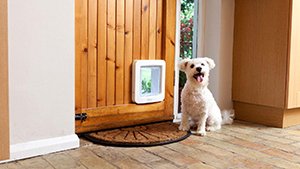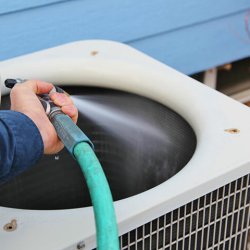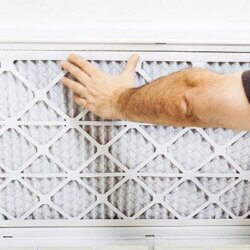
If you have a pet, then there are high chances that you have a pet door as well. Whether you know it or not, the pet door is affecting HVAC energy efficiency in your home. As a result, the heating and cooling costs in your home could be going higher than they normally should. You are probably wondering what the pet door has to do with the HVAC energy efficiency in your home. Read on to find out more.
In the meantime, if you are experiencing any problems with HVAC energy efficiency in your home, it may be time to bring in the experts. Galmiche & Sons is an HVAC company in the St. Louis area whose experience spans over 60 years. You can reach us at 314-993-1110 for all your heating & air conditioning needs.
How Do Pet Doors Affect Your HVAC Energy Efficiency?
It is a basic principle of physics that heat moves from a warmer zone to a cooler zone. This means that your pet door provides access for the heat to move. During the summer, heat will be gained through the pet door and lost through the same during winter. As a result, the HVAC energy efficiency will lower, and your HVAC unit will have to run longer cycles so as to compensate for the heat gained or lost. This will eventually result in higher utility bills.

Here are two ways in which the pet door will directly affect your HVAC energy efficiency:
- Airflow: A typical pet door measures about 12 inches in size. Such a door will allow 70 cubic feet per minute of airflow when open. Depending on the differential temperature between the indoors and the outdoors, this will lead to heat either getting out or in every time the door is opened.
- Direct air leakage: Often, most pet doors are usually designed with a gap around the door flap to allow the door to open and close more easily. This gap is accountable for up to 3 square inches of direct air leakage. Moreover, the door material is usually plastic with little or no insulation to resist heat transfer.
Ensure the Pet Door Does Not Affect Your HVAC Energy Efficiency
Ensuring that your pet door does not affect your HVAC energy efficiency will translate into lower utility bills. For this reason, when installing a pet door, it is important to bear the following in mind:
- Get a solid door: If your pet does not have any special needs, then you may want to consider a solid door as opposed to a flexible flap. With a solid door, there will be less heat loss due to conduction by the door material.
- HVAC energy efficient doors: When shopping for a pet door, look for one that has a label indicating that it is energy efficient. These usually have double sealing and are tested for air leakage and heat transfer. This means that they are more energy efficient as compared to regular pet doors.
Learn More About HVAC Energy Efficiency
If you still have questions regarding your pet door and your HVAC energy efficiency, feel free to contact us at Galmiche & Sons. Give us a call today at 314-993-1110, and we will be glad to help you with all of your energy efficiency and heating & air conditioning problems.









